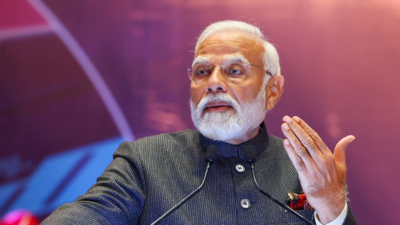NEW DELHI: Prime Minister Narendra Modi’s recent reference to timely warnings from the IMD easing worries for families of lakhs of sea-bound fishermen brought into focus a unique system of sharing weather alerts through use of indigenously developed transponders on marine fishing vessels.
Odisha, Maharashtra, Karnataka, Diu, Goa, Gujarat and Andhra Pradesh have already installed transponders on over 4,000 vessels under the Centre’s plan to install one lakh such devices in 13 coastal states/UTs by Dec.
The ones used in Odisha saved the lives of many fishermen who were out in the high seas during Cyclone Dana in October last year. Besides saving the lives of fishermen by timely sharing of weather alerts, the transponders —wireless tracking devices that use radio frequencies to operate — are also useful from a security point of view as they can be used for monitoring, control, and surveillance of marine fishing vessels.
In case fishermen cross maritime boundaries, alerts will be issued to them to avoid unintentional transgression. It’ll help Indian fishermen who unintentionally cross into the maritime boundaries of neighbouring countries – Pakistan, Bangladesh and Sri Lanka – and get detained by security agencies. Such episodes invariably require significant diplomatic efforts to secure their release.
There are 66,106 mechanized fishing boats and 1,35,763 motorised fishing boats currently operating throughout the coastal States/UTs. All the mechanised fishing vessels and a part of motorised fishing vessels will be covered by installing transponders under the present phase by December. “Remaining ones and the new vessels, if any, will be covered in the next phase,” said an official.
The transponder is a two-way communication system enabling the fishermen to send short messages using their Android mobile phone while fishing up to 200 nautical miles from the coast during any emergency to seek rescue operations. Information related to the Potential Fishing Zone (PFZ) will also be made available to the fishermen on their mobile with the VCSS.
“The system, designed to provide access to all features in the regional languages, also has efficient harbour management tools like token system for entry and exit of fishing vessels, and details of fishing crew on board establishing traceability of fish catch for compliance to international guidelines,” said the official.
The VCSS will help fishermen through Isro’s navigation satellite system, called NavIC (Navigation with Indian Constellation), which can provide accurate real-time positioning information, helping fishermen stay informed about their location relative to national boundaries.
“Fishermen will be notified if they approach or cross the national boundaries. If they accidentally cross the boundary, they can report their position and intention. Such reporting will help in negotiating their safe return,” said the official.
Currently, European Union (EU) nations, such as the USA, Australia, New Zealand, Canada, Japan, South Africa, and Chile, are using transponders on fishing vessels to enhance safety, improve monitoring, and combat illegal fishing.




